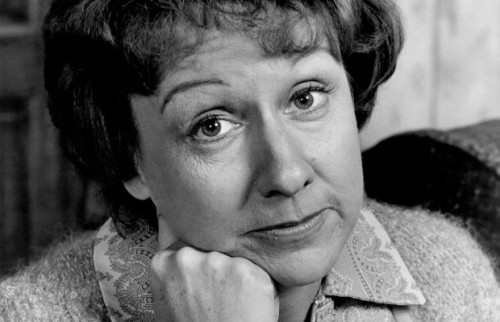
I first encountered Edith Bunker nearly a decade after she had died. It was somewhere in my high school years, and a far different world than the one depicted in All in the Family, but Edith resonated with me. It wasn’t so much that I identified with her; it was more a matter of what her character brought to the show and the issues it tackled. But more than that it was the performances of Jean Stapleton that profoundly influenced the way I saw the world.
Episode after episode Ms. Stapleton’s performances provided that foil to Archie’s intolerance; in her own remarkable way Edith brought out the complexities in the situation. Not only did she illustrate the absurdity of Archie’s rigid beliefs, she also made it impossible for us to simply reduce Archie to a type. It was in the depth and resonance of Ms. Stapleton’s performance as Edith that we viewers were invited to see the genuine complexity of ideas and people.
Over the years Edith guided us through menopause, breast cancer, racism, sexism, homophobia, and ultimately death. While the writing was certainly extraordinary, it was Ms. Stapleton’s genius that brought us one of the most genuinely complex characters we will ever encounter on television, and that in spite of Edith’s seeming simplicity.
To this day there is a single episode that is imprinted upon my mind: Edith’s 50th Birthday. It is an episode (actually two) that dealt with an attempted sexual assault on Edith. Not only was this a largely taboo topic, but it radically shifted the prevailing consideration of rape from being about an excess of attraction to one of power and violence. Even as I was in high school, the “But She Was Wearing Black” defense was still commonly utilized (and it unfortunately still is). The very premise presupposes that the victim was somehow too provocative, irresistible, and thus at least partially culpable.
The portrayal of sexual assault here was horrific: it depicted the manipulations and mind games, the physical and psychological violence, the attempt to have the victim (Edith) internalize the blame and guilt even as the assault was taking place.
And then the aftermath, the effort to come to terms with the event. Ms. Stapleton led the audience through such a complicated path of trying to come to terms, the need for comfort and solace even as she needed to provide that to her family. The desire to forget the unforgettable placed at odds with the need for justice. Edith walked us through the profound impotence that comes from being violated and the painful path of reclaiming a sense of security and authority. And the most remarkable part of Ms. Stapleton’s performance is how she directed the responses and actions of the rest of the case, how she held that incredibly painful center around which the other characters could then build their grief, their impotence, and their struggles.
In those episodes Ms. Stapleton revealed more about the reality of sexual assault than the news media is capable of doing now; Ms. Stapleton built her performance of the simple, basic, profound, and mundane facts of being rather than the unfathomable generalities. In Edith, Ms. Stapleton eschewed abstractions in favor of an empiricism based on what seems so self-evident: the world is complex, but only because we make it so. The real problem is that we cannot seem to disentangle ourselves from the complexity we have wrought.
This is the wisdom of Edith Bunker as Ms. Stapleton portrayed her: the world is really simple, but in our hands simplicity is far too often dangerous (as illustrated by the dueling simplicities of Archie and Mike). So Edith, instead of being simple, remains as the voice of complexity, the perpetual, “Yes, but…” in almost every situation. Edith never allows us, the viewers, to be comfortable in a simple reading, whether it be of other characters or profound issues; nothing is ever simply black and white – least of all race.
It is in Ms. Stapleton’s portrayal of Edith that I found that simplicity is indeed complex, that there is almost always another level to be considered, that not all voices are equal, but that they are part of the equation. Throughout my academic career I have taught Edith Bunker as part of my design classes, exploring the subtle intricacies of dealing with complex issues, the nuanced practice of building up an idea through the seemingly simple details. I owe more than I can say to Ms. Stapleton’s performances, as a scholar, as an artist, and as a person.
So, rest in peace Ms. Stapleton; your genius will be missed but never forgotten. At least in these small ways you have indeed changed the world.
-t









2 Responses to A Eulogy (for Jean and Edith…)